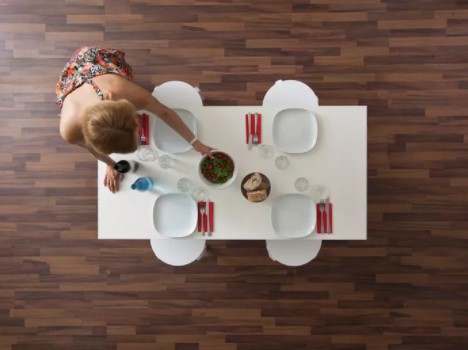
Laminate, Hardwood or Luxury Vinyl Plank - Which To Choose?
With seemingly endless options out there, deciding what’s best for your home or project can be a daunting task. Here’s the low-down on some of the pros and cons of these 3 increasingly popular types of flooring:
Laminate – Laminate planks have a top layer that is a digital print, or photograph, with a high-density fibre composite in-between the top layer and the backing. The variation in images can differ depending on brand and quality. Less pattern repetition = a more natural look like the real thing. Laminate requires little maintenance except for careful regular cleaning. Keeping it away from water is a must, as the boards will swell and peel if moisture isn’t taken care of right away. It’s not as soft as some other types of flooring, but can still be scratched or dented with very heavy or sharp objects. In recent years, laminate has been made to be more durable and resilient. Because it is a manufactured material, greater selection is available – colours, patterns and widths that you may not be able to find in natural wood flooring.
Pros: Affordable, durable, relatively easy to install, less commitment, lots of selection.
Cons: Unaddressed spills or moisture can cause swelling and destroy planks, pattern repetition and variance is important, may not positively impact home value in the same way as hardwood or tile.
Hardwood – Hardwood today can be placed into two categories: Solid and Engineered.
Solid hardwood is a plank cut and processed from a tree and nothing added to reinforce it. As a result, boards only come in a limited width. Engineered hardwood consists of a solid hardwood veneer on top of a plywood or high-density fibreboard core. Engineered hardwood is being used more frequently now because it provides better strength and durability with it’s core, better environmental resistance against heat and moisture, and more selection in terms of wood types and board width.
Being a natural material, hardwood can need special care and maintenance for your floors to last (we always recommend Mirage Floors Hardwood Cleaner). Some types of wood are softer than others, putting it at greater risk of damage from pets, heels or sharp objects. For some, the idea of natural variation may not be desirable. Knots and cracks are inevitable when dealing with real trees, and may show up in a few boards here and there throughout the house. Nature can be unpredictable and if you prefer a more uniform look, there are certain types of wood with less variation, or what we call “character” (such as Maple) or you may opt for a “wood look” in a different material such as laminate or vinyl plank!
Pros: natural feel and appearance – no image repetition, long lasting, adds to home value, greater durability with engineered, can sand, refinish or restore years later.
Cons: Susceptible to water damage, temperature, humidity, creaking and dents, requires moderate care and maintenance, price.
Luxury Vinyl Plank – Luxury vinyl plank (LVP) is plank flooring made of synthetic materials – including PVC, pigments, fungicide and UV stabilizers. It can last anywhere from around 5 – 15 years. The difference in longevity mainly depends on two factors: quality and traffic. Not all luxury vinyl is created equal. If you’re shopping for vinyl plank, pay close attention to something called a “wear layer” – the clear top coat made of urethane-based material which provides protection from scratches, traffic and stains. Most flooring experts recommend a wear layer of at least 12mm for regular use, 20mm if you have pets or are placing it in a very high-traffic area. Vinyl plank with a thin wear layer of as little as 4mm can be found in abundance at the big box stores – this might be great for a quick, temporary change, but offers little in the way of protection, warranty or longevity. Vinyl plank can be easily installed depending on your time and DIY skills, but it’s main draw is that it is often 100% waterproof. Finally, you can have the look of hardwood floors without the maintenance and fear of spills! Similarly, you can recreate a tile or stone look without having to worry about cracks and chipping.
Pros: Waterproof, affordable, durable, easy to install, endless options, very low maintenance.
Cons: Softer than hardwood or laminate – can dent or scratch under heavy objects, potential environmental concerns such as off-gassing, can fade in areas with prolonged sun exposure.
We hope this helps answer some questions you might’ve had while navigating through your shopping journey. Still have questions? Speak to a flooring professional (like the ones at Emporium Carpet & Flooring!) to help you make the best choice for you!
